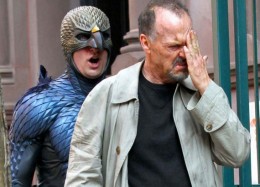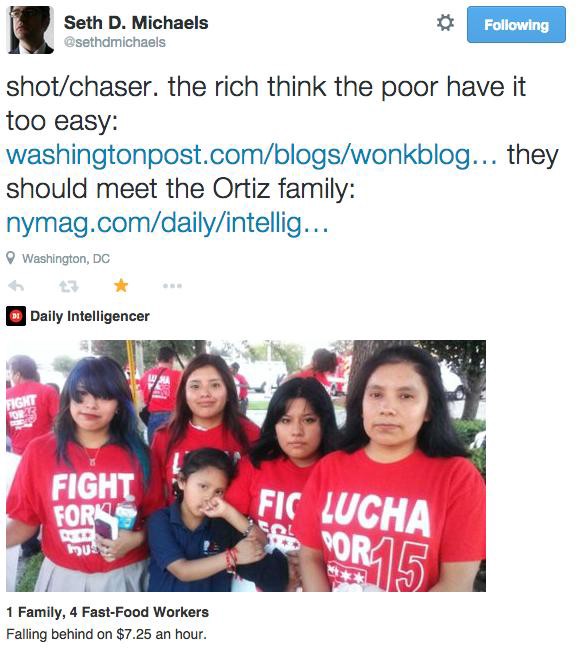Michael Keaton/Douglas, Hollywood, and the Empathy Gap

The man I will always think of as Beetlejuice won a Golden Globe last night for his performance in the heady, propulsive comedy Birdman. In his emotional acceptance speech, Michael Keaton revealed that his original name is Michael Douglas. (The other famous Michael Douglas with whom you might be familiar is the firstborn son of actor Kirk Douglas, who became Hollywood royalty but started from very modest circumstances: he was born Issur “Izzy” Danielovitch to Russian-Jewish immigrants in New York.) This Douglas also revealed that he grew up rough:
In the household in which I was raised, the themes were pretty simple: Work hard, don’t quit, be appreciative, be thankful, be grateful, be respectful, also to never whine ever, never complain, and, always, for crying out loud, keep a sense of humor.
My name’s Michael John Douglas, I’m from Forest Grove, Pennsylvania. I’m the son — seventh child — of George and Leona Douglas. And I don’t ever remember a time when my father didn’t work two jobs. When my mother wasn’t saying the rosary or going to mass or trying to take care of seven kids in a rundown farmhouse, she was volunteering at the Ohio Valley Hospital where I was born in the hallway.
It was a rousing speech, and it reminded me that we in America love stories of hardship, as long as they have happy endings.
Tell us how hard you had it! As long as you had it, in the past tense, and now everything’s great.
The empathy gap was illustrated nicely this morning in my Twitter feed when I saw this from Seth D. Michaels.

Here’s the article in question, from the Washington Post.
Most of America’s richest think poor people have it easy in this country, according to a new report released by the Pew Research Center. The center surveyed a nationally representative group of people this past fall, and found that the majority of the country’s most financially secure citizens (54 percent at the very top, and 57 percent just below) believe the “poor have it easy because they can get government benefits without doing anything in return.” America’s least financially secure, meanwhile, vehemently disagree — nearly 70 percent say the poor have hard lives because the benefits “don’t go far enough.”
Why the surprising lack of compassion? It’s hard to say. At the very top, the sentiment is likely tied to conservatism, which traditionally bemoans government programs that redistribute wealth, calling them safety nets. Some 40 percent of the financially secure are politically conservative, according to Pew. And conservatives are even more likely to say the “poor have it easy” than the rich — a recent Pew survey found that more than three quarters of conservatives feel that way.
Here’s the article about the Ortiz family, from New York Magazine, which serves as a counterpoint. Four of the six family members work or worked in fast food, though the children are also applying themselves seriously to education with the hopes of something better. Several of them are also participating in various labor movements, trying to get wages raised for everyone.
When the rich people surveyed by Pew say they think the poor have it easy, they can’t be thinking of the Ortizes. But are they not thinking of them because they have some false image of what poverty is like in this country superimposed on top of the reality? And do they not see the reality because the media doesn’t show it to them? There are fewer and fewer TV shows about working class or blue collar families, whereas there used to be lots.
a whole area of television remains uniquely uninterested in the working class, and it’s an area where many of its finest examples from the past are about the working class: TV sitcoms, a genre where blue-collar representation is currently minimal. … the networks continue to make series about upper-class characters who never have to worry about money or possessions, including every new comedy this season.
And Hollywood? Feh. Hollywood is so interested in being a dream factory that it shows the grit of everyday life only by accident, when an indie like Winter’s Bone and Obvious Child slips through. We don’t get to see the kind of stories Michael Keaton was telling us last night on screen. I wish we did. Maybe we would have more empathy for each other. And perhaps Gina Rodriguez’s surprise win for the telenovela-style CW show “Jane the Virgin” is a step in the right direction.
Support The Billfold
The Billfold continues to exist thanks to support from our readers. Help us continue to do our work by making a monthly pledge on Patreon or a one-time-only contribution through PayPal.
Comments